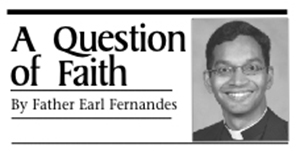Question of Faith: Is it ok to save umbilical blood for stem cell research?
Dear Father: Is it okay for someone to have umbilical blood saved from a live birth to use in stem cell research or attempts to find a cure for diseases like MS?
Dear Reader: The answer to your question is “yes.”
Advent is a time for journeying with the Mary, an expectant mother. It culminates in celebrating the birth of her son, Jesus, the Savior and Word of Life. As Catholics, we are a people of life, cherishing each and every person, no matter how small or how big.
As Catholics, we care not only about the unborn child but also about those born into the world. Many suffer from sickness and diseases like MS, autism, Parkinson’s and cancers. The many healing ministries in the church seek to alleviate human suffering and proclaim the coming of the kingdom. Human life and health are great goods. One goal of medicine is to restore health to the sick person.
The goal of medicine (restoration of health) is good, but not all means to achieve that end are permitted. In Catholic moral theology, the ends do not justify the means. One cannot do evil that good may come about from it. One must choose wisely and prudently how to restore health to a person, while respect the life and dignity of every other human person and the common good. Among the potential means of alleviating suffering is to use stem cells.
The Catholic Church is very clear in her opposition to the use of embryonic stem cells in research. The embryo is to be treated as a person. No one has the right to experiment upon another person without his or her consent. No one has the right to use another person as an object to achieve some good result. No one has the right to take the life of an innocent person, even for a good purpose like curing a disease. Church teaching is found in the Catechism (2274-2275), in the Instructions from the Congregation for the Doctrine of the Faith Donum vitae (1987) and Dignitas Personae (2008).
However, there are other types of stem cells that are not embryonic. The church does not oppose the use of these types of cells to find a cure. For example, stem cells occur naturally in human tissues and have been found in almost every body tissue- skin, muscle, fat, bone marrow. Sometimes these cells can be derived from the sick person himself; other times from a donor. Take the example of a bone marrow. Bone marrow stem cells can differentiate into many other types of tissues and have proven effective in treating many diseases. No one is harmed in using these types of cells. The church does not oppose the use of adult stem cells.
Another source of stem cells, and this applies directly to your question, is placenta and umbilical cord blood, which is rich in stem cells. These cells too are derived without destroying a human life. Blood and tissue can now be stored for later use, such as in a transplant. One advantage to using these cells is that they would be a perfect immunological match for the recipient if the child needed them in the future. The church does not prohibit the use of stem cells derived from cord blood.
Umbilical cord blood and the cells contained offer great life-saving potential, but are often discarded as medical waste. An expectant mother could offer a life-saving gift to others in much the same way that some many blood donors do, but if one wants to save such blood, some planning is required. A woman wishing to donate cord blood should talk to her doctor or OBGYN usually before the 34th week of pregnancy. A detailed medical history is necessary. For example, some things such as a history of cancer, some types of blood infections, HIV, or hepatitis may preclude a woman from making such a donation. A person must also investigate whether a hospital has an umbilical cord blood collection program. All this planning and effort could turn out to be a life-saving gift.
The bottom line is that the church opposes embryonic stem cell use because this destroys the life of a tiny person, but the church sees the use of stem cells derived from tissues or umbilical cord blood as permissible and as potentially life-saving. Advent and Christmas allow us once again to appreciate, nourish, and celebrate the gift of life.
++++++
Father Earl Fernandes is dean of Mount St. Mary’s Seminary and the Athenaeum of Ohio, where he is assistant professor of moral theology. To ask Father Fernandes a question about the faith, send an email to [email protected] or to The Catholic Telegraph, 100 East Eighth Street, Cincinnati, OH 45202.
This article originally appeared in the December 2013 print edition of The Catholic Telegraph.














